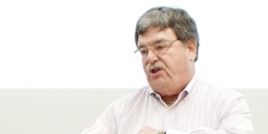
Last week, our Blast Furnace teams heard from three experts on funding early stage companies. The Blast Furnace is the University of Pittsburgh’s student accelerator, which recently launched its inaugural cohort. Two speakers from the 3x3 are funders, the third one is a serial entrepreneur who has been funded by the two funders (amongst others). They had great information and great advice.
Sean Sebastian
We started off with Sean Sebastian, founding partner of Birchmere Ventures. Sean has 17 years’ experience in active venture investing. He is currently raising Birchmere’s fifth fund. Birchmere has invested in 63 companies, 19 of which are still active. Although they invest in many different geographic regions (Austin, Chicago, Los Angeles, and Portland), six of their portfolio investments have been companies based in Pittsburgh. Birchmere focuses on seed and Series A rounds, investing from $500K to $1.5M in pre-product and pre-revenue companies. They almost always syndicate their deals, meaning they bring in multiple VC partners.
“We’ve made every possible mistake along the way,” Sean announced with a smile to the group of entranced Pitt students. “We spend a lot of time working with teams on product-market fit. Our companies think of us as a product manager for hire.”
Sean talked about the fact that all but one of their deals were done through referral; he advised to never contact a VC firm cold. Get a warm introduction. And build a rapport with a potential funder before you need the funding. “We want to be the fund first in mind when you go out to raise money.”
Sean explained how funds work, that his, for example, has a 10-year life at which ending point all of the monies will be distributed to investors. “My investors know that the fund is highly illiquid. They are signing up for the long term.”
He also explained what Birchmere looks for in companies. “Market in the billions. Hopefully I get excited by the market, by the opportunity. I am looking to build a portfolio of 25 or so companies. If one hits, the rest don’t have to do a lot to deliver a really good return.” While Birchmere has been diversified in previous funds, today, it invests only in software. In talking about Birchmere’s approach to founding teams, Sean stated, “We like teams with at least one deeply technical founder.” He added, “We like to see the team go all the way to exit,” acknowledging that they will often support a CEO from founding to exit.
Like many small venture funds, Birchmere’s limited partners, its investors, comprise: “family offices, foundations, high net worth individuals, insurance companies, and universities like yours [Pitt] and CMU. We go through a lot of rigorous due diligence. It will take us six months to do a deal.” So don’t be fooled that a VC deal is quick. In my experience it can happen quickly, but, more often than not, it can take a long time from initial conversation to close.
Frank Demmler
Next up was Frank Demmler. Frank has been in a lot of roles during his time in the Pittsburgh entrepreneurial ecosystem. Most notably, Frank is vice president of entrepreneurial services at Innovation Works, one of the nation’s oldest economic development organizations. Innovation Works (IW) does approximately 12 new investments per year. The organization has been instrumental in 3000 entrepreneurial efforts, leading to the formation of 500 companies. Frank told us, “Our job at IW is to help our companies be attractive to Sean. We give startups the opportunity to run like hell.” IW invests as convertible debt. Since 1999, IW has invested $70M in over 220 companies, which have, in turn, raised over $1.6B in follow-on funding.
Frank focused on his simple Founder’s Pie calculator, which helps co-founders split the equity at founding. Frank’s Founders’ Pie is a simple weighted spreadsheet that will help founders calculate percentage ownership of a startup based upon what they bring to the table. “As painful as it may be to have that conversation, as much as you want to avoid it, do it now!” Frank counselled that all founders’ shares should vest over time. You can read Frank’s article about Founders’ Pie here.
Eric Boduch
Serial entrepreneur, Eric Boduch, was up next. His latest endeavor is Pendo. Eric’s talk was called “Funding a startup.” He began with a bold statement: “Instead of starting with the what you do, start with the why you do.” He continued, “You can’t raise funding before you have your stuff together.” What he means is; there are things you have to do before you are ready to raise funds. See my NewVenturist “Startup Briefs” blog series about how to prepare for funding.
Eric talked about when you should raise money:
- When capital constrains you unduly
- When to raise is partly driven by competition
- When things are good
- When you can
He also talked about what you need have to raise money:
Seed and Series A: team and vision
Series A: happy customers, usage growth, $x in revenues ; #y of users
Series B: you know how to scale sales and marketing, $x in revenues; #y of users – you have metrics
Who should you raise money from? Eric’s advice:
- Investors you can work with
- Investors who share your why
- Investors that can help you get to the next level
“Don’t wait,” he told us, quoting Mark Twain. “The time will never be just right. Might as well do it now.”
Lessons learned from the “3x3?” There were a lot of them. My top five takeaways:
- Know why you are raising money
- Know whom you are raising money from
- Know when to raise money
- Know what you will do with the money and how that builds value
- Do your homework and be prepared. Have your startup house in order